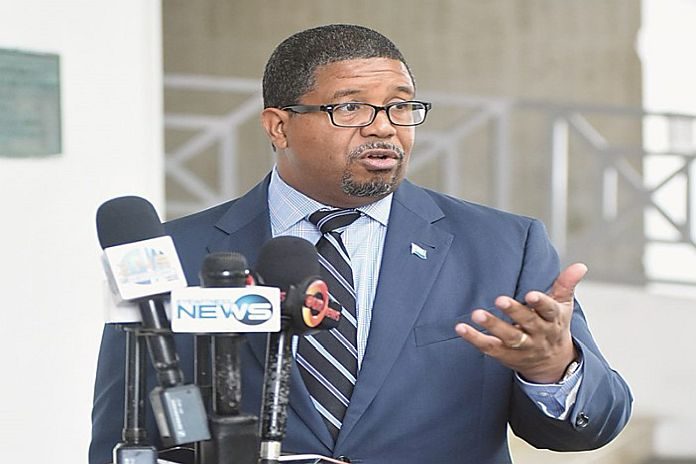By Rachel Knowles
NASSAU, Bahamas — A combination of lost revenue from Abaco and Grand Bahama in the aftermath of hurricane Dorian, along with associated spending and un-budgeted items not related to the storm, is projected to push the country’s fiscal deficit for 2019/2020 to a record $677.5 million.
The government is projected to borrow an additional $587.9 million to cover the revenue shortfall and expenditure increase. As a result, government debt itself is projected to hit a record of $8.2 billion, or 64.4 percent of gross domestic product.
The numbers included in the supplementary budget statement tabled in the House of Assembly by deputy prime minister and minister of finance Peter Turnquest, leave government’s previous deficit target of $137 million in tatters, as predicted in the fiscal strategy report tabled last November.
Government spending for the fiscal year of 2019/2020 is projected to be $308.1 million more than was initially forecast. Turnquest also revealed $120 million of the additional spending is non-hurricane related.
“Recurrent expenses are projected to be higher by $157.6 million, bringing the revised estimates to $2,687.6 million,” Turnquest said.
“Of this total, approximately $82.7 million is associated with hurricane Dorian.” Turnquest said an additional $150.5 in capital spending is also projected, with $100 million of that “directly related to hurricane restoration”.
Of the non-hurricane spending, $37 million is for spending by the Public Hospital Authority (PHA) for renovations at Princess Margaret Hospital (PMH).
“The government recognizes that the current state of the Princess Margaret Hospital is unsatisfactory, and the renovations to this key pillar of infrastructure can no longer be delayed,” Turnquest said.
Another $30 million was allocated to the acquisition of a turbine generation plant for Bahamas Power and Light (BPL), which Turnquest said is “in line with the government’s move to a more resilience-based economic strategy” in addition, “$27.3 million has been spent on that turbine, which is currently at BPL’s Blue Hills plant.
Turnquest said $30 million will go toward skill enhancement and human relations initiatives in the public services to improve efficiency and transform the sector. He also said another $100 million will go toward that initiative over the next three fiscal years. Roughly $23 million was spent in December on lump-sum payments for government employees.
The government also gave another $16.1 million to Lucayan Renewal Holdings, the special purpose vehicle that manages the yet-to-be-sold Grand Lucayan property the government bought in 2018, and $6.8 million to Beaches and Parks Authority.
Turnquest said $80 million of the borrowed money will come from an Inter-American Development Bank (IDB) contingent credit line of $100 million; $50 million from a loan from the Caribbean Development Bank (CDB) on an eight-year term at 4.8 percent interest; and up to $200 million from a club loan from a consortium of domestic bank lenders. The remaining $177.9 million will be “sourced by way of other instruments”.
In addition, he said the government will convert $80 million of its short-term debt to long-term debt, which counts toward borrowing but not as additional debt. Turnquest said: “The borrowing will also be supplemented by $20 million from the Dormant Accounts Fund and a $12.8 million payout from the CCRIF (Caribbean Catastrophe Risk Insurance Facility).”
“Notwithstanding the new deficit and debt positions being projected as a result of hurricane Dorian and its economic fallout, the ministry of finance will remain vigilant and will work hard to come in at a number below the $677 million deficit currently being projected,” Turnquest said.
“In other words, while the government has been and will continue to fully fund the recovery efforts, this unfortunate event will not be used as a pretext to go on unnecessary spending binges.
“This government will remain committed to the principle of sound fiscal principles. Simply put, we will not use the hurricane as an excuse to go ‘buck wild’ and waste the people’s money. This Minnis-led administration will continue to deliver effective social assistance, strong economic stimuli, and sound public financial management. Any sacrifices we have to make in the short-term will help to deliver the medium and long-term benefits the Bahamian public deserves.
“Our work has just begun, but we will endure until completion, guided at our fiscal and economic helm, by the principles of fairness, responsibility, and transparency.”
Republished with permission of the Nassau Guardian





